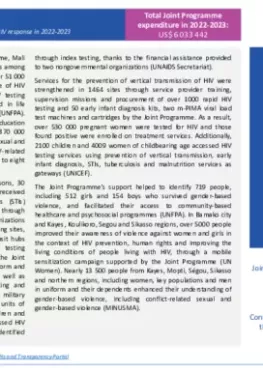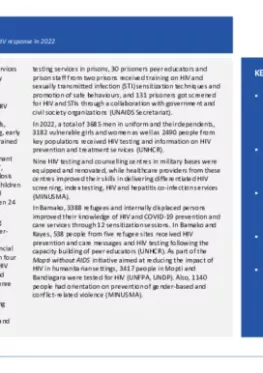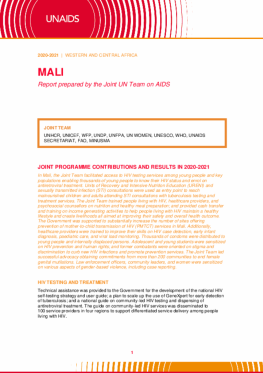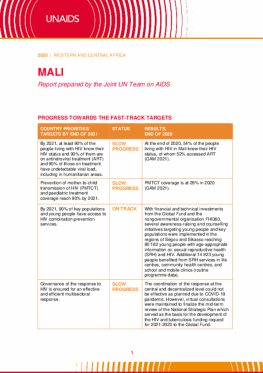|
Mali
With sustained strategic support from the Joint Programme, Mali scaled up HIV awareness creation and testing programmes among young and key populations in 2022-2023. For instance, over 51 000 adolescents and young people improved their knowledge of HIV and sexual and reproductive health and accessed HIV testing services during an education and testing initiative held in life centres and schools in Bamako, Kayes and Sikasso regions (UNFPA). A digital campaign based on the Hello Ado app and Education Saves Lives and radio programmes also reached over 870 000 adolescents and young people with information on HIV, sexual and reproductive health, gender-based violence and HIV-related stigma, thanks to technical and financial support provided to eight youth associations (UNESCO).
To improve HIV prevention and testing services in prisons, 30 prisoners peer educators and staff from two prisons received training on HIV and sexually transmitted infections (STIs) sensitization techniques and promotion of safe behaviours through collaboration with government and civil society organizations (UNAIDS Secretariat). A total of 1325 people in gold mining sites, internally displaced populations centres and refugee transit hubs were sensitized on HIV prevention and accessed HIV testing services through technical and financial support from the Joint Programme (UNHCR, IOM). In addition, 3685 men in uniform and their dependents, 3182 vulnerable girls and women as well as 2490 people from key populations received HIV testing and information on HIV prevention and treatment services in military bases (UNHCR). Finally, in intensive nutrition recovery units of Segou and Sikasso, more than 5000 malnourished children and people who are diagnosed with tuberculosis or STIs accessed HIV testing services; and 85 people living with HIV were also identified through index testing, thanks to the financial assistance provided to two nongovernmental organizations (UNAIDS Secretariat).
Services for the prevention of vertical transmission of HIV were strengthened in 1464 sites through service provider training, supervision missions and procurement of over 1000 rapid HIV testing and 50 early infant diagnosis kits, two m-PIMA viral load test machines and cartridges by the Joint Programme. As a result, over 530 000 pregnant women were tested for HIV and those found positive were enrolled on treatment services. Additionally, 2100 children and 4009 women of childbearing age accessed HIV testing services using prevention of vertical transmission, early infant diagnosis, STIs, tuberculosis and malnutrition services as gateways (UNICEF).





